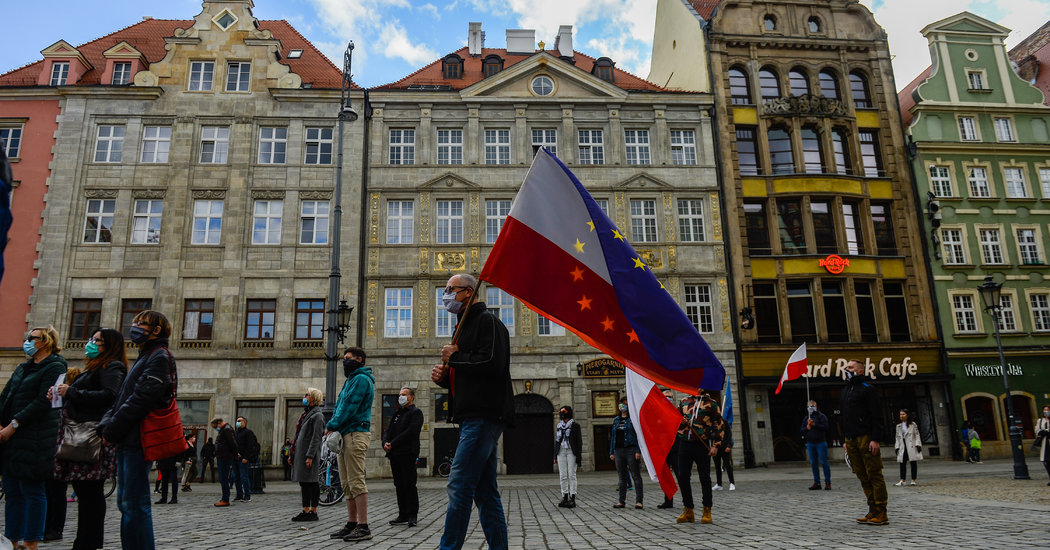WARSAW — Poland’s presidential election has been postponed just days before the governing party planned to go forward with a hastily organized, mail-in vote that had been denounced by opposition candidates as a power grab.
The vote, which had been set for Sunday, would have been Europe’s first presidential election during the pandemic, but the timing has been contentious since the coronavirus swept across the continent. Opposition candidates — who had to halt their campaigns because of the crisis — had called on the government to reschedule.
The governing Law and Justice Party had been determined to shift to an all-mail vote — one in which its candidate, the incumbent Andrzej Duda, had been seen as the clear favorite.
But the required legislation was fiercely contested, and there was little time to organize postal ballots for more than 30 million citizens. The effort itself appeared to run afoul of Poland’s Constitution, which says changes should not be made to electoral law less than six months before a scheduled election.
The Law and Justice Party’s plan came to an abrupt end late Wednesday, when it and its junior partner in the coalition announced that they would delay the vote, blaming the opposition though offering no other reasoning for the move.
But leaders of the Law and Justice Party are still pressing publicly for a quick election, aware that a period of sustained economic pain will follow the lifting of the national lockdown and fearful that voters will take it out on them.
Poland’s democratic institutions have been rattled by the actions of the governing party, analysts say, and the pandemic has further shaken that order. Though the country still has a vibrant civil society and strong opposition parties, it is at risk of democratic disintegration, a report by Freedom House warned on Thursday.
In recent weeks, the European Court of Justice ordered Warsaw to halt a disciplinary regime for judges that was widely seen as politically motivated. And just last week, the European Commission opened another legal case over a more recent Polish law that seeks to punish judges who criticize the government’s judicial overhaul.
“If Poland continues on this course, it will join hybrid regimes and autocracies that routinely mete out politicized justice,” Freedom House said in its report.
Poland was one of the first countries in Europe to react to the outbreak, with a strict lockdown and closure of its borders. Almost two months since it first introduced a requirement that people wear protective masks in public, among other measures, Poland has a relatively low number of infections. As of Thursday, about 15,000 cases of Co-19 and 755 deaths had been reported.
Like many other countries in Europe, Poland has started relaxing some restrictions, reopening hotels, shopping malls and sports arenas as well as some museums and art galleries. It is also set to allow some international travel.
But it could be a temporary reprieve. According to the European Center for Disease Prevention and Control, Poland is one of a few countries in the European Union where the epidemic is not slowing down.
In pressing to go forward with the vote, Law and Justice had made the case for unity and continuity. “What we need today, among other conditions to resist the crisis, is also political stability,” said Jaroslaw Kaczynski, the leader of Law and Justice, in a recent radio interview.
When it was clear that the May election could not take place as normal, the government pushed a bill through the lower house of Parliament in less than four hours that called for the vote to be done by mail.
The legislation then moved to the opposition-controlled Senate, which does not have the power to entirely reject bills. Senate leaders said they would delay it for as long as was in their power: 30 days, or until just four days before the scheduled vote.
The government insisted it would not be deterred.
In order to make sure that the election went ahead as scheduled, it appointed its deputy defense minister as the head of the Polish postal service. When some local governments refused to share voters’ personal data with the postal service, arguing they could not do it until the relevant law was passed, officials tried to retrieve the data from one of the ministries but it turned out to be incomplete.
On Wednesday night, when it was still not clear if an election would take place as scheduled or how exactly voters would cast their ballots, the candidates met for the first and only official presidential debate. It was a bizarre spectacle: a debate that included opposition candidates who were boycotting the election.
Less than an hour after the debate ended, the governing coalition, apparently yielding to the large practical problems, issued its statement delaying the vote. The Supreme Court is expected to void Sunday’s election and the speaker of the lower chamber will set a new date.
That vote is expected to take place in June or July.
It, too, may take the form of an all mail-in vote.



